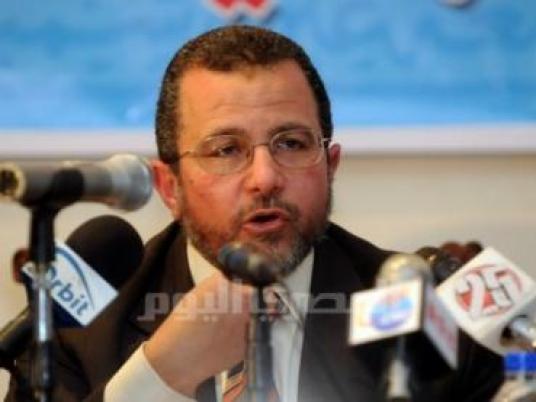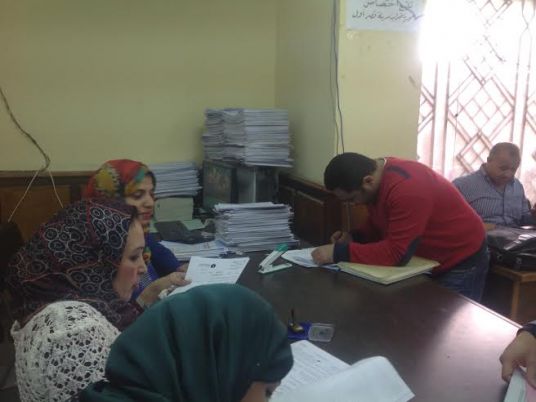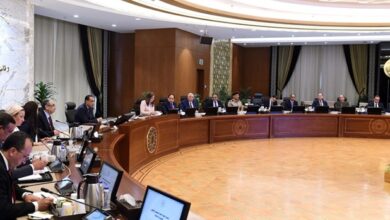
As Prime Minister Hesham Qandil announced his mostly technocratic Cabinet on Thursday, many reacted with disappointment. Observers say that, in the absence of prominent political figures among the new ministers, the first Cabinet following the presidential election bears little difference from the past temporary ones.
Since 2011’s unrest, Egypt has been run by one caretaker Cabinet after another. Following the election of the Muslim Brotherhood’s Mohamed Morsy as president, the next cabinet was expected to be the first one since the revolution with a vision and long-term solutions for Egypt’s problems.
Despite the Muslim Brotherhood’s rigorous attacks against the former Cabinet led by Kamal al-Ganzouri, the newly appointed prime minister kept some of the most strategic ministers unchanged. Most notably, Defense Minister Hussein Tantawi, who also heads the Supreme Council of the Armed Forces, Foreign Minister Mohamed Kamel Amr and Finance Minister Momtaz al-Saeed remain in their positions.
Moreover, Morsy has appointed the outgoing prime minister, which the Brotherhood insisted for months that the interim military rulers sack, as a consultant in his presidential team.
Except for five ministries that the Brotherhood and its political arm the Freedom and Justice Party claimed for themselves, including the ministries of higher education and information and the ministry of legal and parliamentary affairs that was given to the moderate Wasat Party, the rest of the ministers in the new Cabinet have no direct political affiliations.
The Investment Ministry, which was cancelled following the revolution, was reinstated, and three state bodies were upgraded to ministries: the Water and Infrastructure ministry, the Youth Ministry and the Sports Ministry.
As he announced the Cabinet on Thursday, Qandil made it clear that after meeting with 80 candidates over the course of the last week, political affiliations were not taken into consideration. He stressed that only efficiency, understanding of the sector in question and willingness for public service were taken into consideration, with no regard to any other factors.
Yet, Mohamed Naeem, member of the Social Democratic Party, says that the vision and mandate of the new Cabinet remain unclear.
“I don’t see much of a difference between this Cabinet and the other ones in the past period — it’s a new caretaker government with the only difference being that it has more of a Muslim Brotherhood leaning,” says Naeem.
Naeem adds that the bureaucratic nature of the Cabinet started with the choice of the prime minister himself, who doesn’t have a political affiliation.
“We don’t know if the Cabinet with this formation will be able to carry out Morsy’s promises,” says Naeem. “The solutions to Egypt’s political and economic problems are political; they don’t require a Cabinet that will just run things on a daily basis.”
Even though the Brotherhood only claimed a few ministries, Naeem argues that they succeeded in appointing ministers from outside the Brotherhood who are sympathetic to the group.
The new justice minister, Ahmed Mekky, whose appointment was met with satisfaction because of his history in the struggle for the independence of the judiciary, is also known for having some Islamist inclinations.
Wael Khalil, a leftist activist whose name came up as a potential adviser to Morsy, dismisses what he calls “the myth of a technocratic Cabinet” as a counterproductive principle that has acquired a positive connotation.
“This is the same that happened in [Hosni] Mubarak’s era. They consider the minister a technical position while it has a lot to do with a bias and a political agenda,” says Khalil.
Khalil says that with a neutral Cabinet that doesn’t give an indication of its direction, he’s waiting for a vision for the whole Cabinet to be revealed, including the mission of every ministry within this vision.
Meanwhile, changes in the names of potential ministers in the past week and last minute surprises show that political calculations were also part of the selection process.
With deliberation stretching to the last minute before the new Cabinet was sworn in Thursday evening, the ministries of civil aviation, sports and endowments were settled hours after Qandil gave a press conference in which he was supposed to announce the full formation.
Following a controversy around the initial choice for the Endowments Ministry, Qandil surprised everyone with a last minute change, naming Al-Azhar scholar Talaat Afify instead of Osama al-Abd, president of Al-Azhar University who was recommended by Al-Azhar leadership but rejected by other members as a Mubarak-era figure.
Qandil’s first pick was Salafi Sheikh Yousry Ibrahim, which was met by outrage from Al-Azhar, which insisted upon maintaining its traditional input in the choice of endowments minister.
After they were only offered the Environment Ministry, the Salafi Nour Party refused to participate in the Cabinet, accusing the Brotherhood of going back on its promise to assign it more strategic ministries.
Others have also complained of the Brotherhood’s decision-making, which they say didn’t take into consideration the opinions of the other currents as promised.
The centrist Adl Party issued a statement on Wednesday rejecting the new Cabinet for belonging predominantly to the Islamist current and voiced its concern that the Muslim Brotherhood Guidance Bureau could have pressured the prime minister to choose particular candidates.
Ahmed Maher, the founder of the April 6 Youth Movement, also condemned the Brotherhood’s one-sided decision making process while maintaining the group’s right to dominate the Cabinet as the ruling party, in a statement released following the formation of the Cabinet.
“This is a continuation of the bizarre decisions that emerge without any consultation and without clear criteria. We don’t ask for a place for other currents in the Cabinet because this is illogical, but all we demand is transparency and announced criteria for the choices,” Maher says.




